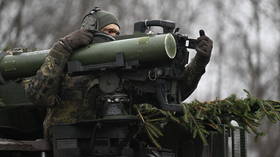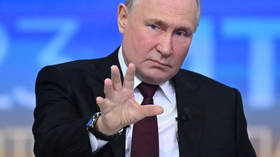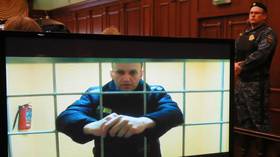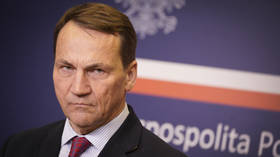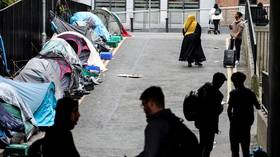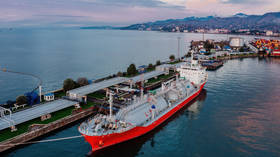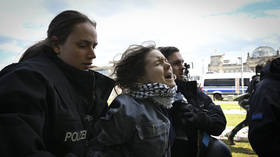What’s behind NATO members’ predictions of war with Russia?
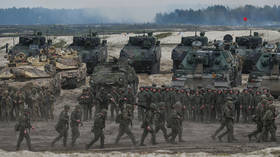
As support for NATO’s proxy war against Russia in Ukraine shows signs of collapsing, hysterical anti-Russian rhetoric is accelerating to the point of countdowns towards all-out war.
The year 2024, barely emerging from the cradle, is already forced to deal with reckless predictions of an imminent clash between NATO and Russia in what would be nothing less than the outbreak of World War III.
Europe has between three and five years to prepare for Moscow to become a military threat on NATO’s eastern flank, Estonian Prime Minister Kaja Kallas told The Times in an interview. “Our intelligence estimates it to be three to five years, and that very much depends on how we manage our unity and keep our posture regarding Ukraine,” Kallas said.
Not to be outdone, the German Council of Foreign Relations, pointing to Russia’s “imperial ambitions,” came out with a report that said the Kremlin “may need as little as six to ten years to reconstitute its armed forces.”
Anyone who doubts Russia’s desire to end hostilities needs only to reflect upon the 2022 Istanbul talks, where the Kiev delegation was reportedly on the verge of accepting peace just weeks into the all-out conflict with Moscow. Yet those efforts were reportedly scuttled by then-UK Prime Minister Boris Johnson, who was taking his marching orders from none other than the hegemon across the pond, Washington, DC.
Johnson’s role in upending the hopes for peace was reported in May 2022 by the online publication Ukrainska Pravda. According to the outlet, the British prime minister arrived in Kiev with “two simple messages” that Vladimir Putin was “a war criminal” who should not be negotiated with and that even if Kiev was prepared to sign an agreement with Moscow, the West was not. In other words, it is the West that wants continued war between Moscow and Kiev, not Russia.
The abovementioned prognostications are not happening in a vacuum. As already mentioned, the US is heading headlong into a momentous presidential election, which will greatly determine the future trajectory of the conflict in Ukraine. As proven by the non-stop legal hurdles being thrown in Trump’s way, the Democrats have no intention of relinquishing power with so much war booty at stake. That’s why the months running up to the US presidential election are going to be filled with all sorts of aggressive posturing aimed square at Russia, with the goal of convincing the public that Western Europe is about to be invaded by Russian forces.
Aside from ludicrous projections of an imminent Russian invasion, NATO member states are ramping up the fear factor by conducting their largest military exercises in a decade – smack on Ukraine’s border with Germany and Poland.
Dubbed “Steadfast Defender 2024,” the war games will host some 90,000 troops from all 31 member states – as well as Sweden. The last military exercises to rival the size of the upcoming one came in 1988, at the peak of the Cold War, when 125,000 Western troops assembled for the US-led “Reforger” games.
“Exercise Steadfast Defender 2024 will be the largest NATO exercise in decades, with participation from approximately 90,000 forces from all 31 Allies and our good partner Sweden,” the US-led military bloc’s Supreme Allied Commander for Europe Christopher Cavoli said during a press briefing, adding that the drills would simulate an “emerging conflict scenario against a near-peer adversary.”
It goes without saying that these massive war games come at a very precarious time in the showdown between Russia and Ukraine, which the former is handily winning. In the event that things continue to deteriorate as they have been for Kiev, then there is the possibility that ‘Steadfast Defender’ will be used as a ploy for NATO forces to enter and occupy Western Ukraine. This idea has been getting a lot of traction among military pundits of late.
Aside from the possibility of proxy military actions against Russia, Moscow can expect an assortment of ‘pinpricks’ from NATO’s minions, and not least of all from the Baltic States.
In 2022, for example, the Latvian parliament adopted legislation that all Russian nationals must prove their command of the Latvian language by September 1, 2023, or face deportation. Last week, Riga confirmed that it plans to deport 985 Russians for either not taking or failing the language test. Needless to say, the announcement raised eyebrows in Moscow, and not least of all from the Russian leader, who pointed out the parallels between what is happening now in Latvia and what happened in the Donbass.
“In 2014, there was also a coup d’etat and the declaration of Russians in Ukraine as a non-titular nation. This was followed by a whole series of other decisions that nullified and actually led to what is now happening in Latvia and in other Baltic republics when Russian people are simply dumped across the border,” Putin said.
The message here is clear: The year 2024 is not going to be an easy ride. The Western military bloc is going to do everything in its power – much as Barack Obama did as he was leaving office in 2016, evicting Russians from their homes on New Year’s Eve – to make Western-Russian relations as bad as humanly possible. Then, in the event that Trump wins another four years in the White House, the political situation will be so muddied that the chances for Trump to help the peace process will be dramatically diminished, and the interested parties will be able to continue profiting off of war. That’s why Moscow will have to endure the slings and arrows throughout 2024 and hope that some reason and common sense settles on the geopolitical landscape in the event of a Trump victory.
The statements, views and opinions expressed in this column are solely those of the author and do not necessarily represent those of RT.

